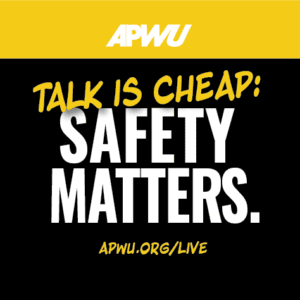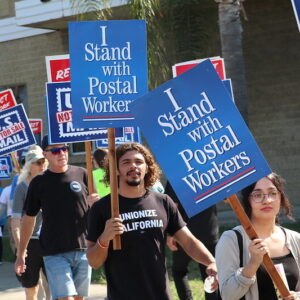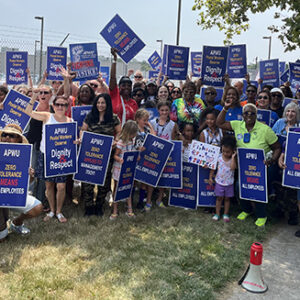May 1, 2017
You Have a Right to a Safe Workplace
(This article first appeared in the May-June 2017 issue of the The American Postal Worker magazine.)
By Industrial Relations Director Vance Zimmerman
Your safety at work is a priority to the American Postal Workers Union (APWU). We want you to come to a safe workplace and to return to your families each day, without injury. Sadly, you cannot rely 100 percent on the Postal Service to make sure you are protected and your workplace is free from hazardous conditions. It is each member’s responsibility to watch out for his or her own safety, as well as the safety of our union sisters and brothers.
The first step to ensure you are safe at work is to know your rights. Under federal law, you are entitled to a safe workplace, free of known health and safety hazards. You have the right to be trained in a language you understand and work on machines that are properly maintained, with all necessary safety protections installed. Management must provide safety gear and protect employees from toxic chemicals.
Should you have concerns, you have the right report to them to management without the fear of retaliation.
It is within your rights to request an Occupational Safety and Health Administration (OSHA) inspection, speak with the inspector, see copies of the workplace injury and illness logs, review the records of work-related injuries and illness, and see copies of test results done. When necessary, your rights allow you to report a work-related injury or illness and to seek medical treatment for it.
Your union will always protect your right to a safe workplace, as well as your ability to report an issue free of retaliation. Enforcement of safety laws is one of the largest benefits of union representation. The APWU takes that responsibility very seriously.
Report Your Concerns
You can assert your rights in various ways. We encourage you to file a PS-Form 1767 Report of Hazard, Unsafe Condition or Practice when safety issues arise. This is one of the most important steps in addressing unsafe working conditions.
PS-Form 1767s must be readily available at your worksite for your use. When you turn in this form to your supervisor, they are instructed to investigate the alleged hazard during the same tour of duty the report was received. Management should abate the hazard if possible, note on the form what corrective action was taken and sign the form. The form has four (4) copies and you must be given a copy with the supervisor’s actions to abate the hazard notated on the form.
The process does not always end there, especially if the hazard could not be immediately fixed. During the process to fix the issue, you should be kept informed of what is being done and what the final solution was to abate the hazard.
Scan the QR code to the right immediately to pull up a PDF version of the PS-Form 1767 on your phone or tablet. If you choose to use this PDF to report a hazard, be prepared to submit four separate copies of this form per issue.
When to Contact OSHA
When the safety issue is not resolved by reporting it to management, or you believe the safety problems are egregious and being ignored by the Postal Service, you have the right to file a complaint with OSHA. The law protects employees and their representative’s right to file complaints and request OSHA inspections of their workplace if they believe there is a serious hazard or their employer is not following OSHA standards.
You do not have to know what specific OSHA standard is being violated in order to file a complaint, but there is a time restriction on citations. OSHA may only issue citations for current and/or violations within the past six months. Therefore, a complaint must be filed as soon as a hazard or lack of compliance is noticed.
Complaints may be filed online, faxed, mailed or made via telephone to your local OSHA office. Go to www.osha.gov and click on “workers” to learn more about your rights or to file a complaint. I also encourage you to visit the Industrial Relations page at apwu.org for the latest safety updates and contact information for your regional APWU Safety and Health representative.
Photographs or Video on USPS Property
In February, the APWU was involved in a case out of Austin, TX that the General Counsel of the National Labor Relations Board (NLRB) filed against the Postal Service over the USPS’ multiple policies against photographing, audio recording and video recording of anything inside or on the premises of a Postal Service facility. The General Counsel of the NLRB contends that ELM provision 667.2 (Interception of Oral or Wire Communications by Postal Employees), Handbook AS-805 5-5(s) prohibiting the use of unauthorized cameras in certain locations and Administrative Support Manual Section 663.4 requiring permission to use postal trademarks and copyrighted material, can all be construed as chilling an individual’s right to engage in protected concerted activities guaranteed under Section 7 of the National Labor Relations Act.
At the hearing, the Postal Service argued that unlike private employers where similar rules have been struck down by the NLRB, it is its duty to prevent the photographing of the mail (an obligations under the Privacy Act). They also argued that the special security needs of the Postal Service and the need for confidentiality in the Equal Employment Opportunity process justify the multiple restrictive policies as well.
The APWU, National Postal Mail Handlers Union and National Association Letter Carriers all intervened and participated in the hearing. I attended and provided testimony about the realities of why recording or photographing in a postal facility can protect both the health and safety of employees in addition to the workers’ rights in situations where they are facing discipline but a union steward is not available.
Attorneys for all sides submitted their written post-hearing briefs at the end of March. We expect the judge will likely render a decision in late spring, which will then go before the full National Labor Relations Board. If the NLRB makes a favorable ruling the handbook will be changed. Until then, the current language is in effect.



